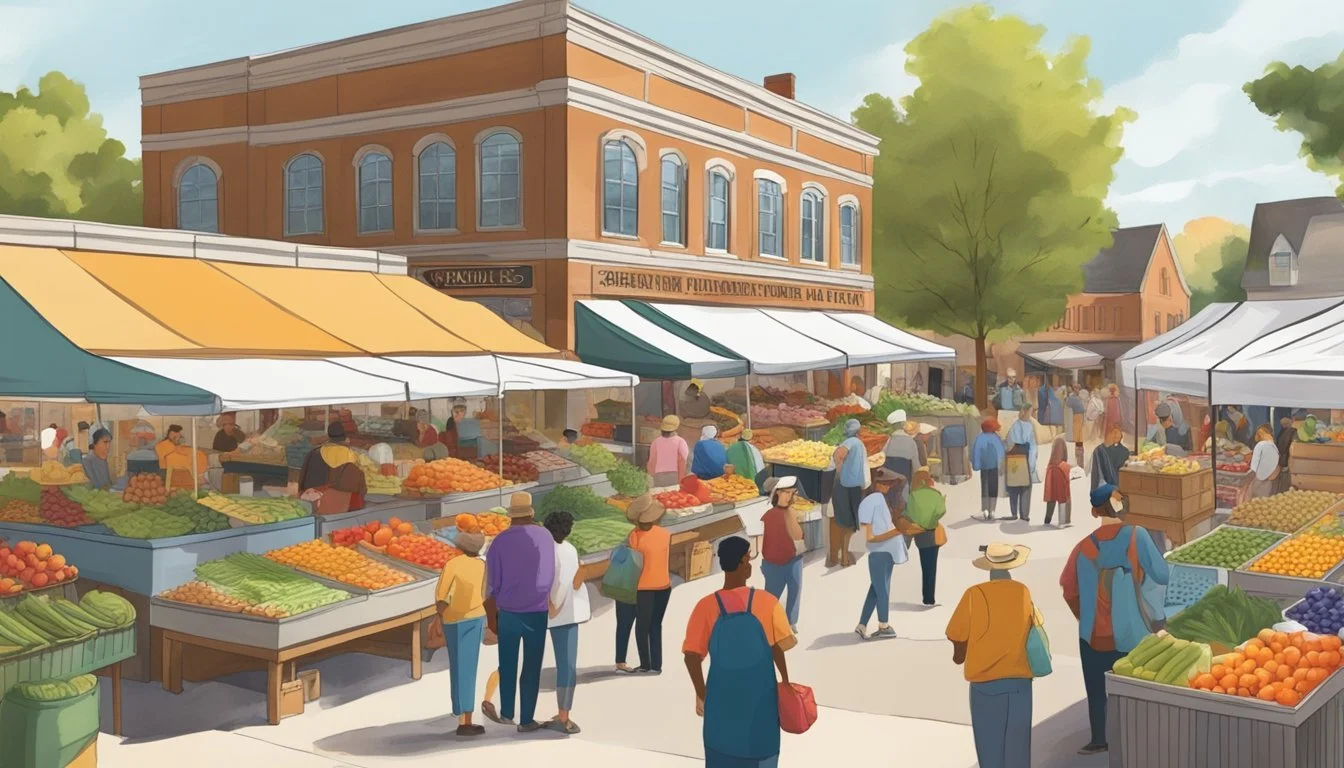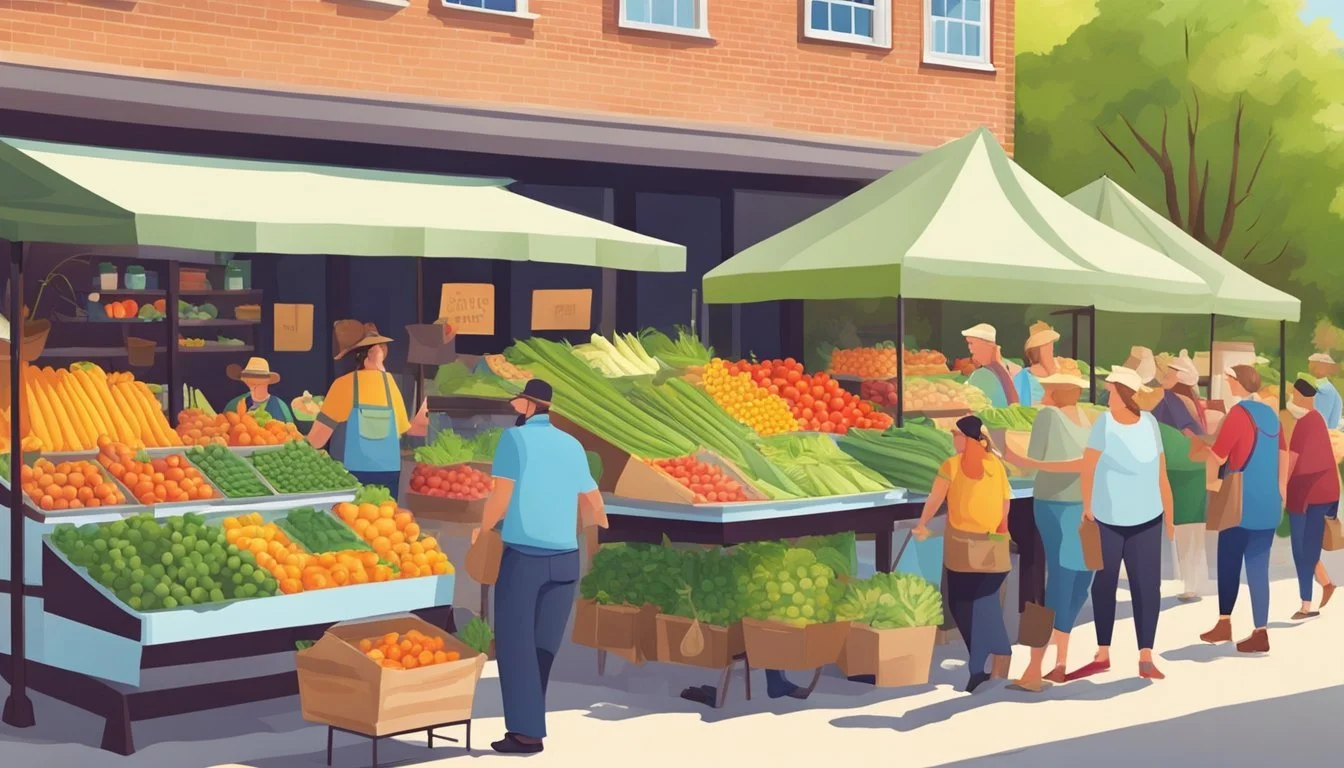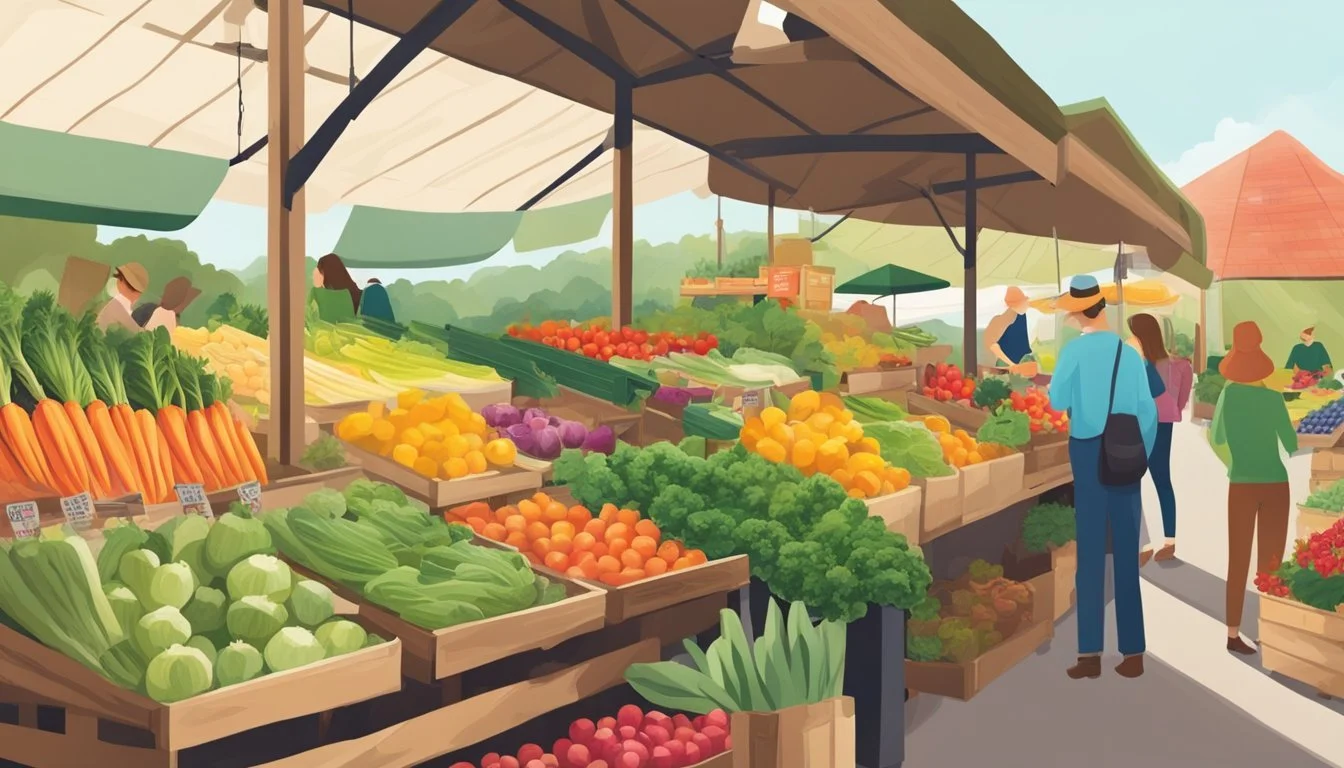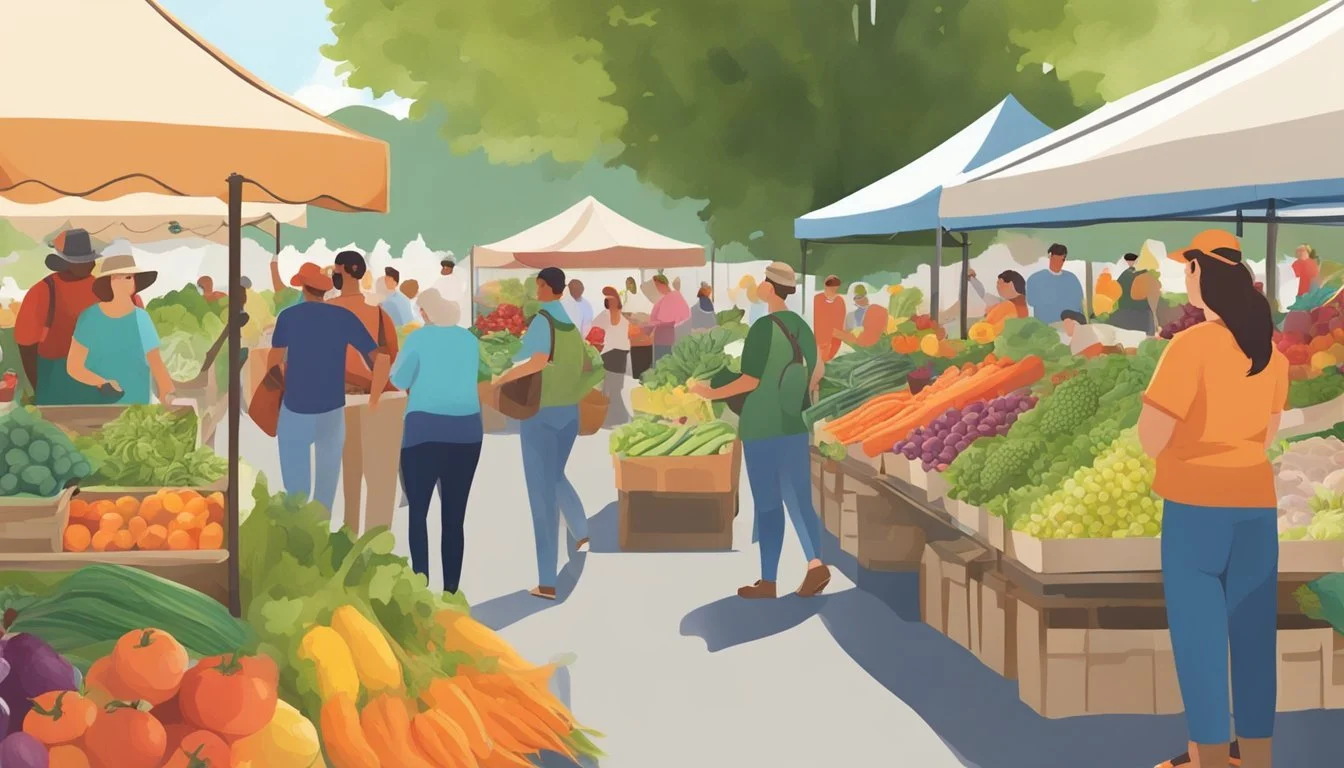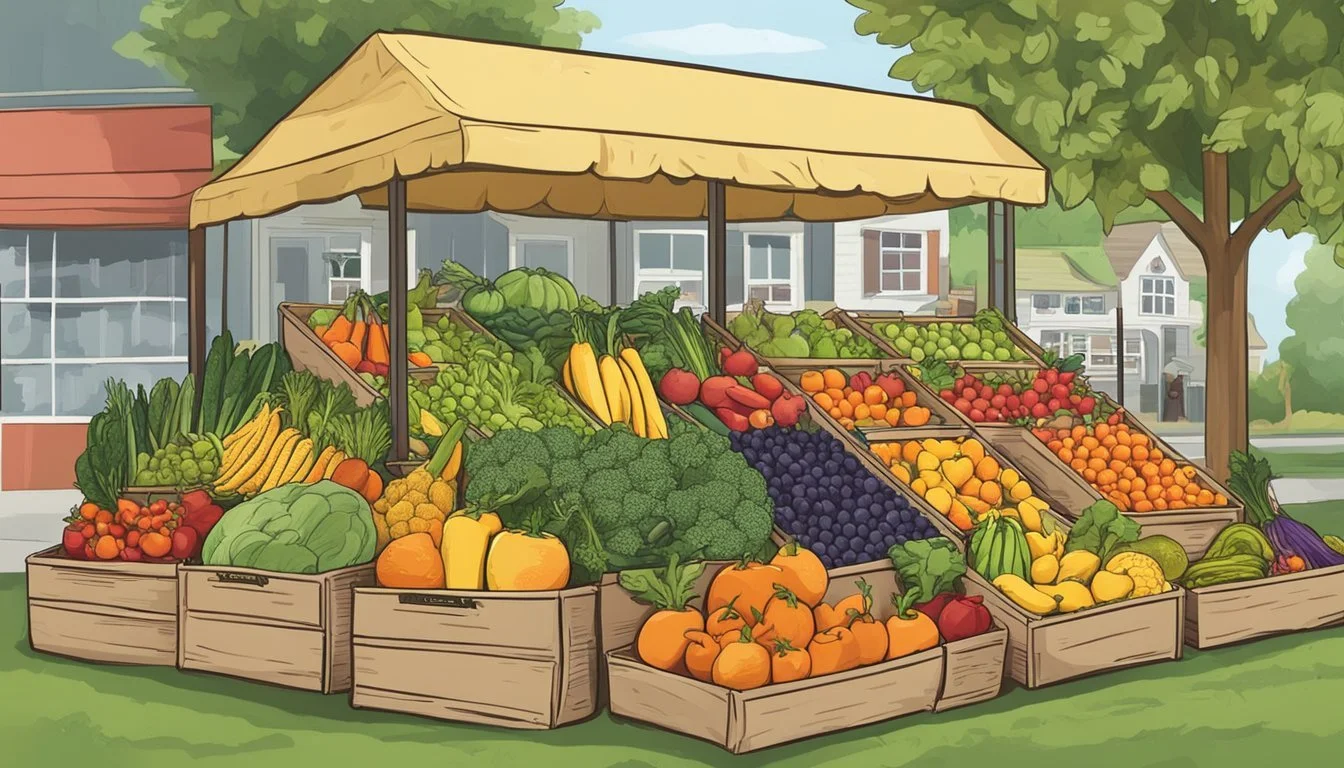Community Supported Agriculture (CSA) in Carmel, IN
Benefits and How to Join
Community Supported Agriculture (CSA) has increasingly become a sought-after way for individuals in Carmel, Indiana, to access fresh, locally-sourced produce directly from the hands of farmers. A CSA functions by allowing consumers to purchase a share of a farm's harvest in advance. This upfront investment provides them with a regular supply of farm products throughout the farming season and connects them more intimately with the source of their food. Members experience the seasonality and variety of regional produce, while supporting the viability of local farming operations.
The concept of CSA embodies more than just a method of procurement – it represents a partnership between consumers and producers. In Carmel, interested consumers can subscribe to local CSA programs, receiving weekly or bi-weekly boxes of vegetables, fruits, and sometimes additional farm products like eggs and meat. This model benefits farmers by ensuring a stable market for their goods and providing them with working capital at the start of the growing season. Additionally, it mitigates some of the risks inherent in farming, as the community shares in both the bounties and shortages that can invariably occur.
Carmel's commitment to health and local sustainability is evident in its embrace of CSA programs. It mirrors a nationwide trend where individuals seek to foster a closer connection to their food sources and bolster local economies. By participating in a CSA, residents of Carmel not only indulge in the richness of Indiana agriculture but also contribute to the preservation of farmland and the continuation of environmentally friendly farming practices within their community.
Understanding CSA
Community Supported Agriculture (CSA) in Carmel, IN, is a symbiotic relationship between local farmers and community members who receive fresh, locally-produced food, often through organic farming methods, in a sustainable and supportive system.
Defining Community Supported Agriculture
Community Supported Agriculture (CSA) is a model where consumers purchase a share of a farm's harvest in advance, establishing a direct partnership. In Carmel, IN, this translates into members receiving seasonal produce every week during the farming season, fostering a local food system. CSA members typically subscribe to a farm, providing upfront capital for the farmer to plan for the season's production.
History and Evolution
Originally a Japanese concept of teikei—literally "cooperation" or "joint business"—the CSA model has evolved over decades. In the United States, the CSA Innovation Network plays a pivotal role in spreading its adoption, tailoring the concept to suit local needs. Carmel's CSA programs often incorporate organic farming methods, adapting to the community's preference for sustainable and eco-friendly practices.
Principles and Practices
CSAs operate on the shared risk and reward principle, where the consumers and the farmers both feel the impact of farming's uncertainties. In return, members enjoy a relationship with their farmer and a deeper understanding of where their food comes from. Sustainable food production is central to Carmel's CSAs, often emphasizing organic methods. This membership-driven model creates a resilient, local food economy promoting seasonal diets and food education.
Benefits of CSA
Community Supported Agriculture (CSA) provides numerous advantages, including improved health from eating fresh foods and bolstering the local economy. The CSA model encourages sustainable food practices, reduces carbon footprint, and enhances the relationship between consumers and farmers.
Advantages for Consumers
Health Benefits: Consumers enjoy access to freshly picked, nutrient-rich vegetables and fruits. These produce items are exceptionally flavorful, as they are often harvested at the peak of their ripeness, delivering superior taste and health benefits over store-bought alternatives.
Economic Efficiency: A CSA share typically offers a diversity of seasonal produce at a lower cost than retail, providing economic value for families and individuals. By participating in CSAs, consumers also contribute directly to the local economy, ensuring their money supports local businesses.
Advantages for Farmers
Stable Demand and Partnership: Farmers benefit from a stable market and demand for their products. The CSA model establishes a direct partnership with consumers, who share both the risks and rewards of farming, which in turn can create a stronger sense of community.
Reduced Marketing and Payment Security: The CSA model minimizes the burden of marketing for farmers since they sell their products directly to the community. This business model also provides farmers with upfront payments, securing their cash flow early in the season and allowing for better financial planning.
Environmental and Societal Impact
Sustainable Food Systems: CSAs support sustainable agricultural practices by favoring a localized food system that reduces the carbon footprint associated with long-distance transportation of food.
Strengthening Local Economies: By keeping the food supply chain local, CSAs stimulate the local economy and maintain money within the community. Additionally, CSAs foster a sense of partnership as consumers and producers both take an active role in the cultivation and consumption of food, which enhances societal health and cohesion.
CSA in Carmel, IN
Community Supported Agriculture (CSA) in Carmel, Indiana, is a thriving initiative that connects residents with fresh, locally-sourced food while supporting regional farmers. By becoming shareholders, members get seasonal shares of the harvest, promoting sustainable agriculture within their community.
Local CSA Programs
Several CSA programs operate in and around Carmel, each with unique offerings and pick-up arrangements. For example, Irvington CSA conducts its distribution every Friday evening, providing produce from Levi Fisher Jr.'s Amish farm in Montezuma. Becker Farms offers a CSA membership that includes meat, poultry, and eggs, and they distribute at the Carmel Winter Farmers Market. Hoosier Harvest Market, an Indiana farmer-owned co-op, enables members to order online with pick-up on Thursdays, supporting multiple local farms.
Popular Crops and Produce
The soil and climate conditions in Central Indiana are favorable for a variety of crops. CSA shareholders in Carmel can expect to receive a diverse range of produce throughout the year, including but not limited to:
Vegetables: Tomatoes, peppers, lettuce, cucumbers
Fruit: Apples, berries, melons
Other products like eggs, meats, cheeses, and occasionally specialty items like flowers can also be part of the CSA shares, depending on the specific farm's offerings.
Community Participation
Community engagement is a cornerstone of CSA programs in Carmel. Participation allows families to eat fresh and learn more about the source of their food. Through membership, they receive not only fresh produce but also recipes and tips on how to prepare them. This fosters a strong sense of community around food and farming, where members are encouraged to visit farms, engage with growers, and sometimes participate in the farming process itself.
Joining a CSA
When someone joins a CSA in Carmel, Indiana, they are purchasing a share of the farm's harvest and becoming a vital part of the local agriculture community. The process involves selecting a membership type, understanding what a share entails, and committing to the shared risks and rewards of the season.
How to Become a Member
To become a member of a CSA in Carmel, an individual typically needs to sign up before the growing season begins. It is during this period that the farmer estimates the number of shares they can provide based on their production capabilities. Members can often join by:
Visiting the farm's website or attending local markets, such as the Carmel Winter Farmers Market.
Completing a membership application form.
Submitting the membership fee, which acts as a pre-season payment to support the farm's operations.
Understanding CSA Shares
A CSA share represents a portion of the farm's produce. Members frequently receive a weekly or bi-weekly box containing an assortment of seasonal produce. This box might contain:
Vegetables: A variety of locally grown vegetables that change with the seasons.
Fruits: Seasonal fruits provided when available.
Eggs and other add-ons: Some CSAs also offer the option to include eggs, cheeses, and other farm products at an additional cost.
Types of shares may vary, such as:
Half shares for individuals or small households.
Customizable shares where members can select the contents.
Member Expectations
Members of a CSA are expected to:
Pick up their share at a designated location during the distribution times.
Understand the nature of shared risk, which implies that produce availability may fluctuate due to weather or other factors affecting the harvest.
Embrace the connection to their food source and community by engaging with the farm and other members.
Respect the seasonal nature of their subscription, which provides foods at their peak of freshness, thereby enhancing meal satisfaction.
CSA Management Tips
Community Supported Agriculture in Carmel, IN benefits immensely from adept management, especially in the sectors of marketing, community engagement, and implementation of CSA innovations. Managers who prioritize these areas can significantly enhance the operation and sustainability of their CSA.
Marketing Strategies
Targeted outreach plays a crucial role in CSA marketing. A CSA can use consumer demand data and AI to tailor its marketing efforts. For instance, analyzing local buying patterns can inform which crops to focus on. Bolster marketing efforts by:
Developing a social media presence to showcase fresh produce and engage with the community.
Leveraging email campaigns that inform potential members about the start of the season and available shares.
Partnering with local businesses to create drop-off points, enhancing distribution efficiency.
Fostering Community Relationships
Building solid community relationships is fundamental. A CSA manager can:
Conduct CSA events for families, deepening the partnership between the CSA and its members.
Offer workshops on the benefits of eating locally-grown food, strengthening the tie to the local economy and educating consumers about their impact.
Innovations in CSA
Innovations help meet both member needs and CSA sustainability. Employing new practices based on CSA innovation network and research could involve:
Introducing an AI-powered platform for better distribution management.
Implementing a flexible share program that allows members to choose the produce they prefer, aligning with individual dietary needs and reducing waste.
Local Impact
Community Supported Agriculture (CSA) in Carmel, IN, has become a cornerstone in strengthening the bond between local food producers and consumers. It fosters a sustainable economic model that benefits all participants.
CSA and Local Economy
Carmel's CSA programs bolster the local economy by ensuring that the money spent on subscriptions circulates within the community. Farmers receive upfront payment for shares, providing them with financial stability and the ability to plan for the season. This model creates a predictable source of income, which can be used to cover the initial costs of seeds, equipment, and labor, effectively supporting local jobs and contributing to a stable economic environment.
For consumers, CSAs represent an investment in local agriculture which, in turn, helps to preserve farming as a viable career path in Carmel. By directly linking the community with food producers, CSAs instill a sense of ownership, where shareholders are seen as partners rather than mere customers, which increases their willingness to support local ventures.
CSA and Farmer's Markets
CSAs in Carmel synergize well with farmers markets, creating a cohesive local food distribution network. The farmer's market serves as a platform for consumers to supplement their CSA shares with additional local products, thereby increasing demand for diverse local goods. This model has prompted a visible growth in the variety and quantity of food available at Carmel's markets.
The presence of CSA stands at the local farmers market introduces community members who may not be CSA members to the concept of shared agriculture. This heightened visibility educates the broader public, encourages local food consumption, and can lead to increased CSA subscriptions, further benefiting the local economy.
Extended Information
In Carmel, Indiana, Community Supported Agriculture thrives by fostering close relationships between the community and local farms. Residents partake in CSA programs that promote sustainable food practices and facilitate educational research on organic farming methods.
CSA Advocacy and Support
Community involvement in CSA programs in Carmel not only bolsters the local economy but also supports agricultural research aimed at enhancing sustainable practices. Through initiatives like the CSA Innovation Network, a partnership has been forged between consumers and farmers to maintain a robust and ecologically sound food system. Residents subscribe to CSA shares, investing in the success of local agriculture and receiving fresh, seasonal produce in return.
Beyond the Basics
Carmel's approach to Community Supported Agriculture extends past traditional models, incorporating modern tools and techniques such as AI to optimize farming practices. Such CSA programs emphasize the importance of organic farming methods, aiming to deliver not only sustainable food but also educational opportunities for the community. By maintaining an open dialogue and fostering a strong partnership between consumers and producers, Carmel's CSA programs continue to evolve and adapt to modern agricultural challenges.
Additional Resources
Research: Latest studies conducted by local universities and organizations are made available to keep the community informed about the advancements in CSA-related practices.
CSA Program Details:
Subscription Availability: Updated regularly to reflect the current growing season and share options.
Organic Practices: Information on the implementation of organic farming methods within the CSA program.
Community Engagement: Opportunities for residents to engage with CSA programs, including farmer's markets and educational workshops.
Last Updated: This section ensures all information provided is current, with the knowledge base reflecting the most recent developments in community supported agriculture.
Conclusion
Community Supported Agriculture (CSA) in Carmel, IN stands as a model for symbiotic consumer-producer relationships. Members of the CSA program report high levels of satisfaction, attributing this to the fresh, locally sourced produce and the direct support to their community's farmers. Participation in this agricultural model goes beyond a simple transaction; it is an investment in the health and sustainability of the local food system.
Members experience a unique connection with their food, understanding where it comes from and the efforts that go into its production. This connection often enhances the appreciation for seasonal eating and can lead to a more conscientious approach to food consumption.
CSA membership encourages local commerce and provides farmers with a predictable income stream, fostering economic stability in the agricultural sector of Carmel. In return, consumers benefit from a diverse array of produce, often finding that their support for local agriculture enriches their own dining experience.
In summary, Community Supported Agriculture in Carmel captures the essence of a successful partnership between producers and consumers, emphasizing:
Local Support: Direct aid to farmers and the local economy.
Consumer Satisfaction: Fulfillment derived from high-quality, fresh produce.
Shared Responsibility: A communal investment in sustainable practices.
With its roots firmly planted in community collaboration, CSA in Carmel, IN presents an exemplary blueprint for communities striving towards food-related self-sufficiency and a strengthened bond between consumer and grower.

